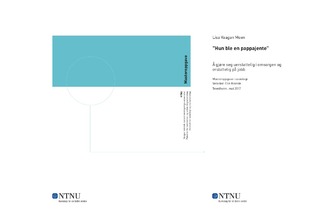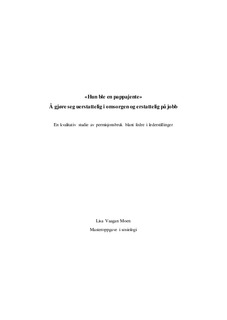| dc.description.abstract | The aim of this thesis was to study the integration of work and family life for fathers in Norway by examining how they use the national parental paid leave system. As part of that system, the father’s quota enacted in 1993, has become a mature institution. Fathers in Norway can choose to use the father’s quota in full time or in combinations with part-time work, the so called flexible father’s quota. For many fathers the quota can also serve as a boundary function as it come to work. However, for some father’s, where career is important, specific challenges can arise with using the parental leave system, and the father’s quota. Research has shown that working fathers risk being deemed replaceable in jobs that, in certain sense, requires them to be irreplaceable.
To extend research on the topic, I conducted qualitative in-depth-interviews with fathers who work in different types of leadership positions. Male leaders therefore formed the base of my study, and interviewing them as fathers enabled me to understand how they experienced their parental leave.
In doing so, I sought to answer three questions. First, how do fathers in leadership positions use the father’s quota, and why? Second, to what extent are fathers in leadership positions available or unavailable for work during the leave period? Third, what experiences do fathers in leadership positions face in terms of replaceability when it comes to their home and work lives? In many ways, the first question marks the starting the point for the rest of the study, since the different uses of the quota can affect father’s subsequent experiences.
My findings indicate that fathers in leadership positions use the earmarked father’s quota, albeit in different ways. When it comes to being available or unavailable for work during the leave period, I argue that it depends on how the father uses the father’s quota. On the one hand, the flexible father’s quota often causes fathers to become available for work. On the other, the coherent father’s quota enables a clear distinction between home and work, since fathers become entirely unavailable for work. Accordingly, fathers can choose to be available or not depending on how they use the father’s quota. At the same time, as my research also shows, the term replaceability has a different meaning than what previous research has suggested. Other than studying the term as it pertains to work, I extend replaceability to home life as well as to childcare during the leave period. My research has revealed that fathers become irreplaceable at home and in the childcare, and replaceable at work. | nb_NO |

